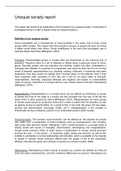Unequal society report
This report will consist of an explanation of the concept of an unequal society; it will explain 5
sociological terms in order to explain what an unequal society is.
Definition of an unequal society
Social inequalities are a characteristic of most societies in the world, and of many social
groups within society. This means that some people or groups of people are seen as having
a higher social status than others. Social stratification is the term that sociologists use to
describe these hierarchies (Billingham, 2007).
Prejudice: Disadvantaged groups in society often get themselves on the receiving end of
prejudice. Prejudice refers to a set of attitudes or beliefs about a particular social or ethnic
group. Normally, people who are prejudice are unwilling, unable and often uninterested in
changing their attitude. An example of a prejudiced view would be that men do not do their
share of domestic responsibilities (e.g. cleaning, cooking, childcare). If somebody was really
prejudiced, then they would not change their mind-set easily on this attitude, even if they
were presented clear examples of men who did in fact do an equal share of domestic
responsibilities. Normally, prejudicial attitudes are negative and based on oversimplified
views of a group. Prejudice is a concept which is very closely linked to the term stereotyping
(Billingham, 2007).
Marginalisation: Marginalisation is a concept which can be defined as individuals or groups
of people who feel on the edge of a society and feel excluded from the way of life and the
status which is often enjoyed by others (Billingham, 2007). Marginalisation can deny groups
of society equal access to productive resources in order to reach their full potential, as well
as gaining access to opportunities. As a result of this, it can push the group into low wage,
poverty and discrimination (Sociology Guide, 2017). Marginalization is the concept of
intentionally forcing or keeping a person in an undesirable position within society.
Social exclusion: The concept ‘social exclusion’ can be defined as “the situation for people
who suffer from a combination of linked problems such as unemployment, poor housing,
high crime rates and poor health” (Billingham, 2007). Social exclusion is a concept which is
closely linked with issues of inequality, discrimination, stereotyping and marginalisation,
though social exclusion refers to wider issues of participation in society. Social exclusion
involves the lack – or the denial – of resources, rights, goods and services, as well as the
inability to participate in normal relationships and activities, which is available to the majority
of people in society. Social exclusion affects both the quality of life of the individuals’
affected, and also the equity and cohesion of society as a whole (Levitas, 2006).
Stereotyping: Stereotyping is when a group of people (e.g. women) are defined as if they all
share the same characteristics, and their individual differences are ignored. Stereotypes are




